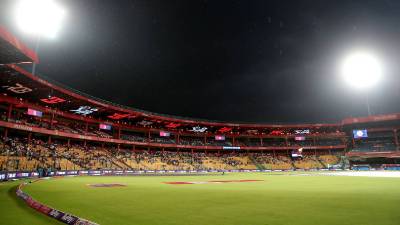Hail Mogambo
On the 15th of Xanthicus roughly, April, AD 74, Eleazer ben Yair, leader of a Jewish community besieged by invading Romans in their rock f...

On the 15th of Xanthicus roughly, April, AD 74, Eleazer ben Yair, leader of a Jewish community besieged by invading Romans in their rock fortress of Masada, rose to address his people. He had a simple message: There would be no surrender. They would all have to die, kill each other, with the last man killing himself.
Eleazer8217;s listeners demurred. Sensing their fear, the charismatic leader rose again, to deliver a final exhortation. Eleazer8217;s pulsating tour de force was not about Israel, the Jewish faith and the barbarians at the gate.
It was, the historian Josephus was to later record, an evocation of the Hindu rite of passage, of seeing death in the flesh as just another milestone on the soul8217;s immortal journey. 8216;8216;Are we not,8217;8217; Eleazer asked, 8216;8216;ashamed to have lower notions than the Indians? And by our own cowardice?8217;8217;
Later that day, 960 Jews killed themselves, the Romans captured a ghost town and Masada became a reference point for courage and resolve for all times to come. To this day, Israeli soldiers take the oath, 8216;8216;Masada shall not fall again.8217;8217;
On the morning Ariel Sharon arrives in New Delhi, it is humbling to remember that perhaps the most iconic event in Israeli history was at least partly inspired by India. For two ancient people, the search for strength in each other8217;s inner reserves is natural8212; in the battle against terror, in the quest for security, in the larger struggle to sublimate civilisational absolutes into symbols of national identity.
This is heady stuff, incorporating the sort of legacy that would give you goose pimples. Yet just so little of it has been perceptible in the past few days. Instead, India8217;s never-failing league of Cold War nostalgics has carpet bombed the opinion pages with a denunication of Israel. Sharon has been savaged, his country demonised, its modern history dismissed as 55 years of state terrorism and land grab.
It would appear baffling. The Israel-India defence partnership has reached critical mass. Weapon systems the United States cannot sell 8212; or does not want to be seen as selling 8212; to India are routinely routed through Israel. To borrow from a contemporary thinker, the two countries are 8216;8216;islands of stability8217;8217; in Asia8217;s 8216;8216;seas of chaos8217;8217;.
As such a more nuanced look at Israel, a reappraisal of obsolete postulates would have been expected. Nothing of the sort happened. Rather, a wild bunch that still views the Middle East through the prism of the Khilafat Movement made an exhibition of itself yet again.
Unwittingly, Sharon8217;s visit has become the latest arena of a certain tension between a rooted, increasingly assertive civil society and its faddist fringe. This tension is at the heart of Indian politics today.
To be fair, large, inward looking societies rarely bring external relations into domestic political discourse. Yet there are moments when a particular foreigner8217;s visit captures the mood of the times. It becomes more important than the sum of its parts, sends a signal beyond the joint communiques and the rest of the diplomatic stock-in-trade. Sharon8217;s visit is one such.
In 1955, Nikita Khrushchev and Nikolai Bulganin landed in India, with the Congress and the Communists competing to welcome them. The visit became emblematic of New Delhi8217;s leftward tilt and, in a sense, took India into the Cold War. In 2000, Bill Clinton8217;s amazingly successful trip was, in effect, India admitting to itself that the Cold War was finally over. Sharon8217;s visit begins, well, the post-Cold War.
Two thousand years after Eleazer ben Yair8217;s moving tribute, it is Israel that serves as an inspiration for India. Primarily, it is a role model in terms of its zero tolerance approach to terrorism.
Israel realised long before India did that bitter, longstanding conflicts don8217;t end in honourable draws. One side has to win a clear victory and then magnaninmously, if paradoxically, 8216;8216;impose8217;8217; a just peace. The relationship between the United States and postwar Germany or Japan is there to learn from.
When it comes to counter-terrorism, the efficacy of Israel8217;s 8216;8216;assassination policy8217;8217; is not lost on anyone, even admired. In 1972, 11 Israeli athletes were killed in the Munich Olympics. Over the next seven years, an operation codenamed Wrath of God 8212; reputed to be the largest such in Mossad8217;s history 8212; hunted down every single terrorist responsible. In contrast, India wrings its hands and waits for Pervez Musharraf to put Masood Azhar under house arrest.
Sharon8217;s second lesson would be that ideology is not an inconvenience you junk the moment you enter government. True, Sharon was a 1980s hardliner who has now matured into a cautious peacemaker. Yet he is no starry-eyed romantic, recognising even if a Palestinian state is a probability, one under Yasser Arafat is a non-starter.
Finally come the cultural underpinnings of nationhood. India is 82 per cent Hindu. In contrast, Israel is 78 per cent Jewish and 15 per cent Muslim. Israel8217;s Muslims or Christians for that matter are equal citizens, serve in the army, find place in Parliament.
Yet there is one watermark that cannot be breached. Minorities have the vote, not the veto. Whatever the struggle between secular and religious Jewish currents, that reality does not change.
It is tempting to see the Indo-Israeli equation as part of a grand American design. This is only half true. As Washington8217;s reconfiguring of the Islamic world gains momentum, a settlement on Palestine and Kashmir will be its carrot to the Arab world.
There may be pressure on Israel to sign a deal with the Palestinians on terms it is not entirely comfortable with. India may feel similarly squeezed. The two countries could see merit in collective bargaining, sometimes working with America, sometimes working on America. A bond forged on the sacred heights of Masada cannot be wished away.
- 01
- 02
- 03
- 04
- 05































